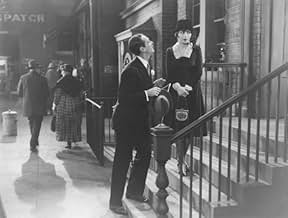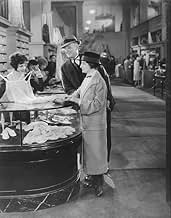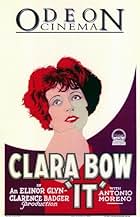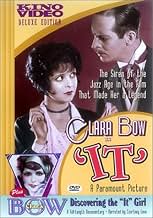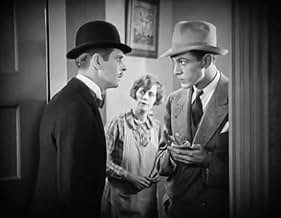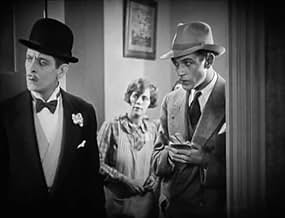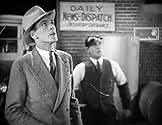VALUTAZIONE IMDb
7,2/10
3854
LA TUA VALUTAZIONE
Una commessa con un sacco di sex appeal insegue un bel playboy.Una commessa con un sacco di sex appeal insegue un bel playboy.Una commessa con un sacco di sex appeal insegue un bel playboy.
- Regia
- Sceneggiatura
- Star
- Premi
- 1 vittoria in totale
Elinor Glyn
- Madame Elinor Glyn
- (as Madame Elinor Glyn)
Elmo Billings
- Office Boy
- (non citato nei titoli originali)
Gary Cooper
- Newspaper Reporter
- (non citato nei titoli originali)
Lloyd Corrigan
- Yacht Cabin Boy
- (non citato nei titoli originali)
Cheryl Holt
- Baby
- (non citato nei titoli originali)
Eleanor Lawson
- First Welfare Worker
- (non citato nei titoli originali)
Rose Tapley
- Second Welfare Worker
- (non citato nei titoli originali)
Dorothy Tree
- Waltham Employee
- (non citato nei titoli originali)
Recensioni in evidenza
Clara Bow's energy and glamour give this otherwise lightweight feature some life, making it quite a bit better than it had any right to be. The rest of the production does have a couple of strengths, but not enough to carry the load. The story is pleasant and generally entertaining, but rather negligible. The "It" theme is overworked, and downplaying it in favor of a little more substance might have improved the movie. Yet it is still certainly worth seeing.
Bow gets a character that allows her to use her strengths while also giving her a chance to do some other things as well, as her character goes through a series of romantic episodes and other experiences. Perhaps one reason why this is one of her best-remembered features is that the role gives her some opportunities to show different sides of her character, as she uses her facial expressions and other resources pretty well.
The rest of the cast is just there for Bow to play off of, and the characters are mostly one-dimensional. Antonio Moreno is solid but sometimes lifeless, and his friend Monty is an annoying character whose only constructive purpose is to advance the plot at a couple of key stages.
One minor asset of the movie is the inter-titles, several of which add a bit of bite to some otherwise trite situations. But the constant references to the "It" concept, which apparently come from the Elinor Glyn source material, get old quickly. It's hardly a very imaginative or significant concept, and a couple of passing references would have been more than enough, so as to allow the story to stand more on its own.
The story itself is told rather well, and there are some enjoyable sequences, especially towards the end. While the whole thing is too superficial to belong on any best-of or must-see lists - especially in a year that produced so many outstanding and significant films - it's a generally entertaining little feature, and it is one of the best showcases for Clara Bow, who was one of the most popular performers of the 1920s.
Bow gets a character that allows her to use her strengths while also giving her a chance to do some other things as well, as her character goes through a series of romantic episodes and other experiences. Perhaps one reason why this is one of her best-remembered features is that the role gives her some opportunities to show different sides of her character, as she uses her facial expressions and other resources pretty well.
The rest of the cast is just there for Bow to play off of, and the characters are mostly one-dimensional. Antonio Moreno is solid but sometimes lifeless, and his friend Monty is an annoying character whose only constructive purpose is to advance the plot at a couple of key stages.
One minor asset of the movie is the inter-titles, several of which add a bit of bite to some otherwise trite situations. But the constant references to the "It" concept, which apparently come from the Elinor Glyn source material, get old quickly. It's hardly a very imaginative or significant concept, and a couple of passing references would have been more than enough, so as to allow the story to stand more on its own.
The story itself is told rather well, and there are some enjoyable sequences, especially towards the end. While the whole thing is too superficial to belong on any best-of or must-see lists - especially in a year that produced so many outstanding and significant films - it's a generally entertaining little feature, and it is one of the best showcases for Clara Bow, who was one of the most popular performers of the 1920s.
this is a very fast paced and cute comedy starring the beautiful clara bow. the plot is fairly routine for it's era, but clara gives this film a real boost. she's especially appealing in a scene where she is making funny faces at her friends baby. the scenes at coney island are also fun to watch. and check out the subtitles with the 1920's slang. pretty funny stuff.
I first saw "It" last year at a mini-festival at the Kemper Museum in Kansas City. The audience was about equally middle-aged (50's, 60's; I'm 63) and young (many 20's and early 30's). Everybody roared with laughter and delight throughout the film.
This is not only a sweet, wacky comedy (with a strong ending--how I wish current filmmakers could learn that lesson!), but also a demonstration, as others have pointed out, of one of the most magnetic personalities ever to face a camera lens. Clara Bow's presence is simply heart-stopping and her basic goodness, at least in this role, is such that it makes me feel maybe there's a little hope for humankind after all.
I watched it again, with a friend, at home this evening and marveled anew at the extraordinary vitality of this wonderful young woman. The extremely silly story doesn't matter in the least. The lesson of the film, as much as there is one, is "where there's a will, there's a way," and to follow the exploits of our heroine's will is pure balm for any weary soul.
This is not only a sweet, wacky comedy (with a strong ending--how I wish current filmmakers could learn that lesson!), but also a demonstration, as others have pointed out, of one of the most magnetic personalities ever to face a camera lens. Clara Bow's presence is simply heart-stopping and her basic goodness, at least in this role, is such that it makes me feel maybe there's a little hope for humankind after all.
I watched it again, with a friend, at home this evening and marveled anew at the extraordinary vitality of this wonderful young woman. The extremely silly story doesn't matter in the least. The lesson of the film, as much as there is one, is "where there's a will, there's a way," and to follow the exploits of our heroine's will is pure balm for any weary soul.
When it comes to IT, Clara Bow was in a league of her own. No other actress I've ever seen has even been close(maybe Jean Harlow). But most actresses since Clara didn't have silent films, which allowed her beautiful expressive eyes, facial expressions, and physical gestures (such as looking between the legs of stuffed toy dog) to do her talking and leave no doubt as to her intent. Her ability to do this made her special. I must admit that even though I loved this film, IT isn't my favorite performance by Clara. I happen to think she displayed as much and possibly more "IT" in some of her other silent movies like MANTRAP, HULA, & THE PLASTIC AGE than in IT. If you don't believe that's possible, then I highly recommend checking out some of her other films and judge for yourself. Even if you disagree, you will enjoy these performances if you enjoyed this film. As a whole, I think IT was the strongest of her silent films (in terms of plot, writing, and character development) that I've seen. Regardless, IT is the film for which Clara is most remembered and the favorite of her modern day fans. From Clara's scheming to reel in her boss as a husband to the hilarious sub-titles ("Sweet Santa, give me him", "Hot socks, the new boss", "I'll take the snap out of your garters", "He couldn't give birth to a suspicion", "On the contrary, I think she's got plenty in reserve"), I enjoyed this 1920s romantic comedy tremendously. Could Elinor Glyn, have been trying to promote her book or herself? IT was only defined 3 times during the movie (in the opening credits, in the first scene where Monty is reading about IT, and when Antonio Moreno asks Elinor Glyn herself in a scene about halfway through the film. I think if modern audiences would give IT a chance, they would be pleasantly surprised with Clara Bow. 9/10
Two years after "It" came out the silent picture would be a thing of the past. Still, the most striking thing about this movie, after the always beautiful Clara Bow, is how modern it looks. On the Kino DVD the picture is sharp and clear, with excellent contrast. It looks as good as black and white can.
The story itself is fluff. The It of the title, which translates roughly as sex appeal, is irrelevant to the plot. Salesgirl Betty Lou Spence (Bow) falls in love with owner of big department store Cyrus Waltham, Jr. (Antonio Moreno). She chases him, he chases her, misunderstanding separates them. Even though the plot is light, it fulfills its modest goals well, largely due to Bow's energy. William Austin, as Moreno's friend Monty, is also a high point. In one key scene he also shows himself to be a far more caring and sensitive person than Cyrus, and probably a better choice for Betty's affections. Sadly, that's not how this kind of movie works.
The camera work is pretty sophisticated for the time. The scenes of Betty and Cyrus's date at the beach, with quick cuts as the two laugh, play and fall in love, are now a cliche, although one that's still used. The use of panning, different angles during scenes and plenty of close-ups keep the movie moving, without the long shots before a stationary camera that characterized many indoor scenes during the silent era. Were it not for the lack of sound and the title cards, one could easily think this movie was made as late as the start of WWII.
"It" is not an important movie in the development of cinema, either in terms of technique or theme. Instead, it's an entertaining romantic comedy, largely due to Bow's electrifying screen presence and Austin's satisfying performance. Clara Bow was a huge star, who defined the female sex symbol during the 20s. Even today it's hard to imagine anyone watching her and being able to deny that she does indeed have It.
The story itself is fluff. The It of the title, which translates roughly as sex appeal, is irrelevant to the plot. Salesgirl Betty Lou Spence (Bow) falls in love with owner of big department store Cyrus Waltham, Jr. (Antonio Moreno). She chases him, he chases her, misunderstanding separates them. Even though the plot is light, it fulfills its modest goals well, largely due to Bow's energy. William Austin, as Moreno's friend Monty, is also a high point. In one key scene he also shows himself to be a far more caring and sensitive person than Cyrus, and probably a better choice for Betty's affections. Sadly, that's not how this kind of movie works.
The camera work is pretty sophisticated for the time. The scenes of Betty and Cyrus's date at the beach, with quick cuts as the two laugh, play and fall in love, are now a cliche, although one that's still used. The use of panning, different angles during scenes and plenty of close-ups keep the movie moving, without the long shots before a stationary camera that characterized many indoor scenes during the silent era. Were it not for the lack of sound and the title cards, one could easily think this movie was made as late as the start of WWII.
"It" is not an important movie in the development of cinema, either in terms of technique or theme. Instead, it's an entertaining romantic comedy, largely due to Bow's electrifying screen presence and Austin's satisfying performance. Clara Bow was a huge star, who defined the female sex symbol during the 20s. Even today it's hard to imagine anyone watching her and being able to deny that she does indeed have It.
Lo sapevi?
- QuizElinor Glyn gave many confusing and sometimes contradictory explanations for what "It" meant, but she always said that "It" did not mean "sex appeal" necessarily and that anyone who said it did was vulgarizing her concept. Nonetheless, "It" became a euphemism for "sex appeal," which caused that pronoun to be entered into the American lexicon as a noun in the late 1920s.
- BlooperAs Waltham climbs onto the anchor, his shirt sleeve is intact. The scene cuts away to Monty and Adela in the rowboat for a brief moment; however, in the next scene, Waltham's sleeve is completely torn.
- Citazioni
Monty Montgomery: I feel so low, old chap, that I could get on stilts and walk under a dachshund.
- ConnessioniFeatured in The House That Shadows Built (1931)
I più visti
Accedi per valutare e creare un elenco di titoli salvati per ottenere consigli personalizzati
- How long is It?Powered by Alexa
Dettagli
- Data di uscita
- Paese di origine
- Lingua
- Celebre anche come
- Quel certo non so che
- Luoghi delle riprese
- Azienda produttrice
- Vedi altri crediti dell’azienda su IMDbPro
Botteghino
- Lordo Stati Uniti e Canada
- 411.891 USD
- Tempo di esecuzione
- 1h 12min(72 min)
- Colore
- Mix di suoni
- Proporzioni
- 1.33 : 1
Contribuisci a questa pagina
Suggerisci una modifica o aggiungi i contenuti mancanti

